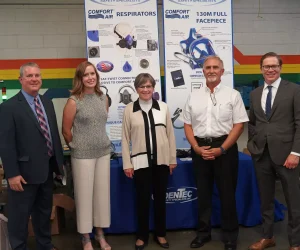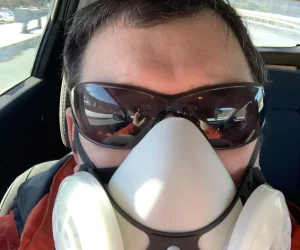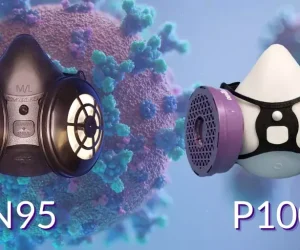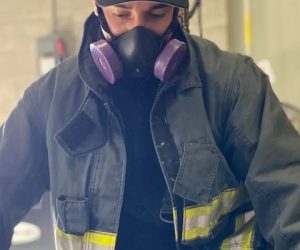Choosing the right safety glasses for the specific hazard and application is critical to reduce the risk of injuries and severity on the job and at home.
Your eyes are your only exposed internal organ, and they can not be replaced. With the loss of just one eye, we completely lose our depth perception, leading to increased change of additional injuries and a lowered quality of life a we become more reliant on others for essential daily tasks.
According to Versant Health more than 2,000 individuals injure their eyes at work each day. 10-20% of work-related eye injuries cause temporary or permanent vision lost. More than 78% of individuals did not wear protective eyewear during the time of the injury.
The good news? Eye protection programs are one of the easiest to implement and the market is saturated with various options. With so many options on the market, our safety specialists have simplified everything you need to consider when selecting the appropriate eye protection for your specific job application.
Choose Safety Glasses that Meet the Most Current Edition of the ANSI /ISEA Z87.1-2020 Standard
In order to ensure your employees are properly protected, make sure to use eye protection that is tested to and meets the most currant edition of the ANSI Z87.1 standard. There is also a higher level of impact protection testing in the standard that tests an eye protector at a higher velocity. Products that are marked with a (+) symbol are tested to the higher velocity and marked as follows; Z87.1 (+). You may also consider selecting eye protection that is certified to the latest CSA Z94.3-20 as an added measure of insurance.
By selecting safety glasses with a CSA Z94.3:20 certification, you’re ensuring eye protection that has been subjected to a rigorous battery of tests to ensure ongoing manufacturing quality and performance. Such tests will include optical clarity, impact protection and rating, UV protection, splash, durability, ignition resistance, etc. by a third party going above and beyond the minimum requirements. This allows companies doing business in both the US and Canada to offer a standardized program for employees.
If you’re interested in learning more, check out the full CSA Z94.3-20 standards here.
See more information on ANSI /ISEA Z87.1-2020.
Find the Most Comfortable Safety Glasses
Comfort is critical: If your safety glasses don’t fit properly or are uncomfortable in any way it is highly likely you won’t wear them. This most commonly occurs when employees remove their eye protection and expose themselves to surrounding hazards.

Most common discomfort issues include:
- temple arms that pinch along the side of the head at the temple area, around and behind the ear.
- glasses which don’t fit comfortably or securely on the bridge of your nose.
- frames that don’t follow the contour of your face shape or size.
- Safety glasses that become irritating with other PPE that is being worn i.e hard hats, hearing protection, respiratory or face masks.
Here are some design features to maximize comfort when choosing the best safety glasses for your crew:
- telescopic temple arms
- rubberized temple tips
- rubberized nose bridge
- optical clarity
- scratch resistant
- spring loaded temple arms
- articulating temple arms
- lightweight
- variety of lens shades/ options; anti-fog, polarized etc.
- Bi-focal/ diopters
- Prescription insert

Stylish Safety Glasses Can Make a Difference
It may come as a surprise to employers, but one of the most important considerations for an employee is the style of the safety glasses. Employees are seeking stylish safety glasses just as they would for prescription glasses. They want to look good on the job and over the past couple of decades, fashion is just as important as safety for workers that are required to wear eye protection and PPE every day.
Consider Anti-Fog Safety Glasses
One of the leading reasons employees remove their eye protection is due to excessive fogging and visibility issues. Manufacturers across the industry have been making significant investments in improving anti-fog safety glasses. Whether this is through coatings directly applied to the glasses through the manufacturing process, creams and sprays applied to the safety eyewear upon usage or using anti-fog cloths and wipes throughout the day, all of these techniques can greatly reduce fogging and improve employee compliance in wearing chosen eye protection.
Further Considerations for Selecting the Best Safety Glasses

Before selecting your safety glasses, it is critical to conduct a hazard assessment to help determine the injury risks within your applications to determine the appropriate safety glasses or face protection.
If you need help conducting a Hazard Assessment, Contact Us and one of our safety specialists will be able to help.
Typical Hazards Include:
Projectiles
Safety glasses were originally designed for the risk of projectiles. Flying objects like a piece of metal can pierce the cornea and eyeball and possibly cause the loss of an eye.
The hazard assessment here is identifying if there is something that could impact the eyes or face at a hazardous velocity and putting a barrier in between. This is the most common hazard, and the #1 reason safety glasses are required for most applications. Even a job as familiar as mowing a lawn has a projectile hazard risk and proper eye protection should be worn.
All Dentec Eye Protection is CSA approved and thus offers high grade protection from projectile hazards.
Dust or Debris
Foam lined safety glasses are growing quickly in popularity mainly because most employers have recognized projectile protection as a leading hazard. But what we see now is dust and debris getting behind non-foam lined safety glasses and causing irritation and injury to the user. In particular, outdoor applications are quite susceptible to these injuries because wind can kick up a lot of dust, dirt, and debris especially in construction or oil & gas working environments.

Options like CeeTecDX™ or the DustDevil™ are ideal for these types of hazards and meet some of the key buying considerations: comfort, lightweight, economical, stylish and CSA-approved.
UV Protection & Glare
Whenever working outdoors, UV protection is an important factor. Rest assured that all Dentec Safety Eyewear provides 99.9% UV defence. If you’re not wearing UV protection in the sun you are putting yourself at high risk of cornea damage, cataracts and macular degeneration. Being able to combine both fashion and function specifically for UV is one of the biggest boxes that Dentec checks.

Glare can make it difficult to see and can cause extreme fatigue to the eye especially if you are on the road all day. Drivers experience a lot of glares all year round whether from the heat on pavement or the sun glare off snow/ ice. Polarized safety glasses like the Hartley & Mango are not only incredibly fashionable but they reduce glare from these scenarios. Safety glasses for drivers add another layer of proven protection while performing duties other than driving. Whether a fork lift driver or someone making deliveries, chances are they are performing tasks on and off machines or in and out vehicles where projectiles could be present so a safety glass that does double duty is critical.

Hydro linemen particularly benefit from the use of polarized safety glasses to help reduce depth perception issues as they are looking upwards towards dangerous electrified hydro lines.
Splash and/ or Chemical Spray
Acid splash and chemicals can burn the cornea, the conjunctiva (white coat on the eye), and the eyelid, possibly causing a loss of sight that is why protecting the eyes and face from this type of hazard is so critical.

With this type of hazard, it is best practice to wear multiple types of eye and face protection for maximum safety. Incorporating the use of chemical splash goggles with an indirect vent coupled with a FaceTec™ Faceshield is the ultimate in liquid splash defence.
On top of eye and face protection, if chemical splash or spray is a hazard, you will also need an emergency eyewash station within your working environment. Check out Emergency Eyewash Stations: Portable VS. Plumbed – Dentec Safety Specialists | USA

See the Dentec Difference

If you haven’t explored Dentec’s diverse line of CSA approved eye & face protection products you could be missing out on increased comfort, style and value. Every application has its own unique safety requirements and that’s why if you need any support in choosing the best eye protection for the job be sure to contact us for a free hazard assessment and eye safety audit.







